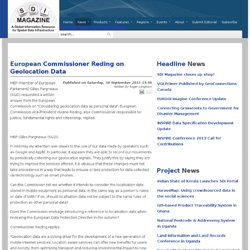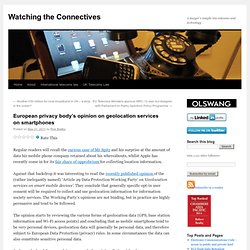

TechWeekEurope UK » EU Demands Explicit Geo-Location Permissions » TechWeekEurope UK. Do European data protection laws apply to the collection of WiFi network data for use in geolocation look-up services? European Commissioner Reding on Geolocation DataSDI Magazine. Published on Saturday, 10 September 2011 15:56 Written by Roger Longhorn MEP (Member of European Parliament) Gilles Pargneaux (S&D) requested a written answer from the European Commission on "Considering geolocation data as personal data".

European Commission vice-President Viviane Reding, also Commissioner responsible for justice, fundamental rights and citizenship, replied. MEP Gilles Pargneaux (S&D): In mid-May my attention was drawn to the use of our data made by operators such as Google and Apple. Can the Commission tell me whether it intends to consider the localisation data stored in mobile equipment as personal data, in the same way as a person’s name or date of birth? Article 29 Working Party - Consent for Geolocation Services, Business Law Firm, Fox Williams.
June 8, 2011.

Techblogger article in Computing magazine on DP and geolocation services « Brodies TechBlog. William Fry - Publication - EU Opinion on Geolocation Services. The EU Data Protection Commissioners’ grouping called the Article 29 Working Party (the “Working Party”) has given an opinion on geolocation services on smart mobiles indicating that prior consent from users is likely to be required.

The objective of the opinion is to clarify legal and other obligations that apply to geolocation services and will influence national regulators. Geolocation services include geotagging of internet content, location based advertising, maps and navigation. The three main types of infrastructure such services are provided on are GPS, GSM base stations and WiFi routers. Article 29 Working Party leaves geo-location service providers disorientated after strict data protection opinion about geo-location data. The Article 29 Working Party has concluded an opinion on geo-location services on smart mobile devices (such as smart phones and tablet computers) by saying that they are linked to natural persons and therefore any geo-location data involving the devices are deemed personal data.

As such, under the Data Protection Directive, the most applicable legitimate ground for processing that data is by giving the users of those devices sufficient information and obtaining their prior, informed consent. The Working Party said that the means of consent must be clear, rather than implied without the user being fully aware. The description must therefore not be hidden away in terms and conditions. The consent must be specific for particular purposes and if the purposes change in any way then further specific consent must be obtained. Users should in any event be reminded at least once every year that location data is being processed about them. Geolocation - Online privacy: who knows about you? - Technology - Which? Campaigns.
Antivirus is as important as ever for protecting your computer against threats, but should you really have to pay to stay safe?

We take a look at the features you can expect to find on both free and paid software, plus the benefits of Microsoft Windows 10 Security, previously known as Windows Defender, and whether you need antivirus on a Mac. If you're ready to buy, take a look at our reviews of the best antivirus software to discover the products that Which? Recommends. Video: how to choose the right antivirus Paid anti-virus software Top protection: Comprehensive defence against fraudsters, viruses, plus anti-phishing to stop scammers Flexible: Pay a little extra to cover multiple devices Useful extras: Identity protection, parental controls, back-up and tune-up tools Many people keep their computer safe by paying for a security suite (almost half of Which?
Generally, they also have better customer service and technical support than free internet security. Free anti-virus software. Geo-location. Dpo_conference_2011_jose_manuel_presentation. Wp185_en. Publications / Increased EU focus on customer consent for mobile geolocatio. Consent requirements for geolocation services on smart mobile devices are set to become more stringent following publication of an Opinion by EU body, the "Article 29 Data Protection Working Party", in May 2011 (the Opinion).

The Opinion sets out extensive requirements for "opt-in" customer consent to be obtained by providers of geolocation services. The Opinion, although non-binding, will be persuasive and no doubt influence the current debate on addressing consent adequately in the online environment, particularly with the Data Protection Directive (95/46/EC) scheduled to be reviewed this summer and the "opt-in" requirements for the use of cookies recently implemented under the revised e-Privacy Directive (2002/58/EC). Implied forms of consent, popular in the UK, now look set to disappear in an effort to protect citizens' privacy and to harmonise data protection regimes across all EU Member States. Data Protection in the Telecommunications Sector - Data Protection Commissioner - Ireland.
European privacy body’s opinion on geolocation services on smartphones. Regular readers will recall the curious case of Mr Spitz and his surprise at the amount of data his mobile phone company retained about his whereabouts, whilst Apple has recently come in for its fair share of opprobrium for collecting location information.

Against that backdrop it was interesting to read the recently published opinion of the (rather inelegantly named) ‘Article 29 Data Protection Working Party’ on ‘Geolocation services on smart mobile devices’. They conclude that generally specific opt-in user consent will be required to collect and use geolocation information for information society services. The Working Party’s opinions are not binding, but in practice are highly persuasive and tend to be followed. So far as the legal framework is concerned, the opinion distinguishes between: From this basis the opinion suggests that: Like this: Like Loading... International technology, telecoms and outsourcing lawyer. Location data should qualify as personal data, watchdogs say. Article_29_Party_Opinion_Nauwelaerts_quoted_5.11. Article 29 Working Party Opines on Geolocation Services.
On May 16, 2011, the Article 29 Working Party (the “Working Party”) adopted an Opinion on geolocation services on smart mobile devices (the “Opinion”).

The Opinion clarifies the legal framework and obligations applicable to geolocation services such as maps and navigation tools, geo-personalized services, geotagging of content on the Internet, child control and location-based advertising. The Opinion addresses specific privacy concerns with regard to the main types of infrastructure used to provide geolocation services, namely GPS (satellite-based) technology, GSM (antenna-based) base stations and WiFi routers. Special attention is paid to services using WiFi access points and their unique identifiers (e.g., Medium Access Control (“MAC”) addresses).
Understanding new guidance on data protection and geolocation services - 12 Jul 2011 - Computing Opinion. The grouping of representatives from the data protection authorities in each European member state, known as the Article 29 Working Party, recently published an opinion on the use of geolocation services on smart mobile devices such as smartphones and tablets. The opinion attempts to clarify how the European Data Protection Directive applies to geolocation data generated by mobile phone mast triangulation and the use of Wi-Fi access points and Global Positioning System (GPS) transponders, which can potentially track the movements of users.
This information may be used not just by the operators of mobile phone networks and third-party geolocation infrastructure services that "map" Wi-Fi access points, but also by apps used on mobile devices, so there are clearly control and privacy issues.
EU to get tough on geolocation data privacy. By Stewart Mitchell Posted on 13 May 2011 at 12:41 The European Union is expected to clamp down on geolocation services in the wake of fears over privacy, according to reports.

Following revelations that Apple and Android phones routinely tracked handset whereabouts, the issue of geolocation has risen to prominence. Now EU regulators are planning to add location to the personal information hotlist, joining identifiable information such as date of birth, names and other key details.